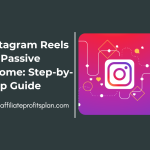Welcome to my article “How to Build Trust with Your Affiliate Marketing Audience” If you’ve ever tried convincing a friend to buy something, you know that trust is everything. Now, imagine trying to sell to an entire internet full of strangers who are naturally skeptical of anything that sounds like a pitch. Welcome to the world of affiliate marketing! Building trust with your audience isn’t just a nice-to-have—it’s the secret sauce that turns clicks into conversions and followers into loyal customers. Without it, you’re just another person shouting into the void, hoping someone clicks that shiny affiliate link.
But how do you earn that coveted trust in a crowded and sometimes shady internet marketplace? Is it about offering the best deals? Or maybe just being “authentically” yourself (while still promoting a product, of course)? The truth is, building trust is a bit of both—and a lot more. It’s about showing up consistently, delivering value, and making sure your audience knows you’ve got their best interests at heart, even if it means recommending a product you don’t earn a dime from. In this article, we’re going to dive into five proven strategies that will not only help you earn trust, but also turn that trust into lasting affiliate marketing success. So buckle up—trust-building is a journey, but I promise, it’s one worth taking.
Access Our Proven Tested Formula for $50-$100 Daily Income – Watch This FREE Video >>

Be Transparent About Affiliate Links and Partnerships
Let’s be real: nobody likes being tricked. Whether it’s a surprise fee at checkout or an email that definitely isn’t a sponsored post but totally looks like one, nobody enjoys feeling like they’ve been led down the garden path. When it comes to affiliate marketing, honesty is not just the best policy—it’s the only policy if you want to build lasting trust with your audience. Transparency about affiliate links and partnerships is key to ensuring that your followers feel like they’re getting the whole picture, not just the “affiliate-approved” version.
First things first: disclose, disclose, disclose. If you’re promoting a product with an affiliate link, let your audience know that you may earn a commission if they decide to buy. It’s like when you ask a friend for advice—wouldn’t you appreciate knowing if they’re recommending something because they’re getting a cut? Be upfront about your relationship with the product, whether it’s a one-off promotion or an ongoing partnership. A simple “This post contains affiliate links” or “I may receive a commission if you click on this link and make a purchase” can go a long way in making your audience feel respected. It’s about transparency, not a full-on sales pitch.
You also want to be mindful of the products you promote. If you’re constantly recommending products that don’t align with your brand or your audience’s needs just for a commission, you might lose credibility. And that’s the last thing you want when you’re trying to build trust. Choose affiliate products that genuinely benefit your followers, and they’ll appreciate your honesty even more. When you’re transparent and authentic, it’s a win-win situation: your audience trusts you more, and your affiliate earnings will be much more sustainable in the long run.
Share Genuine and Honest Reviews
Let’s face it: nobody trusts a glowing review that sounds like it was written by a robot—or worse, someone who’s clearly getting paid to say nice things. You know the ones—”This product changed my life!” followed by a vague, glowing list of features that sound too good to be true. Yeah, those reviews don’t inspire much confidence. And guess what? Your audience isn’t buying it either. The truth is, sharing genuine and honest reviews is one of the easiest ways to build trust with your audience. People appreciate authenticity—and that means giving them the good, the bad, and the “I wish they’d included a few more color options.”
The trick here is balance. It’s tempting to only focus on the product’s strengths, especially when you stand to make a commission if someone buys it. But let’s be honest—no product is perfect. So, if you really want to build trust, you’ve got to show the full picture. Talk about what works, but also don’t be afraid to mention areas for improvement. Maybe the product is great, but the shipping time could use some work. Or the customer service was a bit slow to respond. By offering both the pros and cons, you’re not just selling a product—you’re helping your audience make an informed decision. After all, people like to know what they’re getting into before they hand over their hard-earned money.
And remember, personal experience matters. Don’t just rehash the product’s features from the website or copy-paste what other affiliates have said. Share how the product worked for you. Did that meal prep container really make your week easier? Did that course on digital marketing help you land your first affiliate deal? Personal, real-life stories make your reviews more relatable and show your audience that you’re not just out to make a quick buck—you genuinely care about recommending products that add value to their lives.
Access Our Proven Tested Formula for $50-$100 Daily Income – Watch This FREE Video >>
So, be real. Your audience will respect your honesty and come back for more—not because you promised them the world, but because you gave them the straight facts. And who knows? They might just click that affiliate link after all!
Engage and Build Relationships with Your Audience
Let’s be honest: no one likes being treated like a walking credit card. If you’re only showing up to pitch products and drop affiliate links, your audience is going to feel like they’re being spammed rather than engaged. And that’s not exactly a recipe for trust—or success. In the world of affiliate marketing, building genuine relationships with your audience is just as important as promoting the right products. After all, people don’t buy from faceless strangers. They buy from people they know, like, and trust (yes, even if you’re selling them a blender or a digital course).
The key here is engagement. That means taking the time to respond to comments, answer questions, and show your audience that you’re not just in it for the commission. Whether it’s replying to a thoughtful comment on your blog, answering a DM on Instagram, or engaging in a lively conversation in a Facebook group, the little moments of connection go a long way in building trust. It shows your audience that you care about more than just the next sale. Plus, it makes you more approachable! Who wants to buy from someone who seems like they’re just waiting to cash in? Not me, and probably not your followers either.
But engagement doesn’t have to stop at responding to messages. Building relationships also means offering value without always trying to make a sale. Share useful tips, insightful articles, or even motivational content that aligns with your brand. Offer your audience something they can use, whether or not it’s tied to an affiliate product. This approach shows you’re invested in their success, not just in your wallet. And trust me, when people feel like you’re genuinely trying to help them, they’re far more likely to listen when you do have a product recommendation.
And don’t forget to ask for feedback! Conduct surveys or polls, or simply ask your followers what they want to learn more about. This makes them feel heard and gives you the opportunity to tailor your content to meet their needs, which is a win-win situation. The more you engage, the stronger the bond becomes—and the more likely your audience will trust your recommendations.
Provide Value Beyond Affiliate Promotions
Imagine this: you’re hanging out with a friend, and all they do is talk about the great stuff they’re selling. “Buy this! You need this! It’ll change your life!” After a while, you’d probably start looking for the nearest exit. The same goes for affiliate marketing. If all you ever do is shove affiliate links in front of your audience without giving them anything of real value, they’re going to tune you out faster than you can say “click-through rate.” Building trust is about more than just pushing products—it’s about offering something your audience can use, whether or not it’s directly linked to a sale.
Think of it this way: you’re not just a salesperson; you’re a resource for your followers. If you want to build trust and keep your audience coming back for more, you’ve got to give them content that helps, educates, or entertains—without the expectation of an immediate sale. Share tips, guides, or advice that goes beyond “buy this now” messages. Maybe it’s a blog post on time management, a YouTube video teaching a new skill, or even a podcast episode breaking down the latest trends in your niche. The more you provide value that isn’t tied to affiliate promotions, the more you’ll establish yourself as an authority they can rely on.
And no, you don’t have to give away all your knowledge for free—though that would be nice! Instead, focus on giving your audience actionable insights or resources they can use right away. For example, if you’re in the fitness niche, share a free workout plan or meal prep guide. If you’re in the tech world, offer a cheat sheet on how to choose the best gadgets for specific needs. When you provide value like this, your audience sees you as someone who’s there to help, not just to sell. And when you do share an affiliate link, they’re far more likely to trust your recommendation because they know you’ve got their best interests at heart.
Plus, offering value beyond promotions helps you stand out from the sea of affiliate marketers all peddling the same products. It’s your chance to show that you’re not just in it for the money—you genuinely care about your audience’s success and well-being. And when you care, people listen. They engage. And yes, they click those affiliate links—because they trust you.
Build Social Proof and Trust Signals
If you’ve ever walked past a crowded restaurant and thought, “Hey, this place must be good, look at all these people!”—you’ve experienced the power of social proof. We trust what others trust. It’s a natural human instinct. And when it comes to affiliate marketing, building social proof and trust signals is like saying, “Hey, I’ve got a whole crowd of happy customers over here, and they’re all vouching for me!” When your audience sees that others are already buying into your recommendations, they’re way more likely to follow suit. It’s the “safety in numbers” phenomenon, but in affiliate marketing, it’s also your secret weapon for building trust.
Start by showcasing testimonials and reviews from people who’ve already benefited from the products you recommend. If you’ve used a product yourself and had great results, ask your followers to share their experiences. A positive review or comment about how a product helped someone is like a virtual high five. The more real-life examples you can provide, the more your audience will see that they’re not alone in trusting your advice. This also works for your own content. If you have happy customers or followers who leave glowing comments or success stories, feature them! Social proof doesn’t just come from people who’ve bought the product—it can come from anyone who’s interacted positively with you or your content.
And don’t overlook the power of user-generated content. Encourage your followers to share their own stories, whether it’s through photos, blog comments, or social media posts. When others see real people using the product, it helps to humanize the entire affiliate marketing process. Plus, it gives your audience an added layer of reassurance that this isn’t just another marketing gimmick—it’s a real deal with tangible results.
Another trust signal? Displaying any certifications, badges, or affiliations that lend credibility to your brand. For example, if you’re a part of an exclusive affiliate network, or if you have any awards or notable partnerships, shout it from the digital rooftops! Trust badges and logos from well-known companies can make a huge difference in how your audience perceives your brand’s reliability. The more trust signals you have, the easier it is for your followers to make a leap from “I’m interested” to “I’m hitting that buy button.”
At the end of the day, building social proof and trust signals isn’t about faking it—it’s about showing your audience that you’re the real deal, and other people agree with you. It’s a win for everyone: your audience feels safe, your trust grows, and your affiliate marketing efforts become much more effective. It’s like having a crowd of cheerleaders rooting for you—and who wouldn’t want that?
Conclusion
At the end of the day, affiliate marketing is all about trust. If your audience doesn’t trust you, they’re not going to buy what you’re selling—even if you’re offering the best deal on the internet. But when you show up consistently, provide value, be transparent, and build genuine relationships, that trust will grow naturally. And the best part? It doesn’t happen overnight, but when it does, the results are so much more rewarding than a quick sale.
Access Our Proven Tested Formula for $50-$100 Daily Income – Watch This FREE Video >>
Remember, you’re not just here to push products—you’re here to be a helpful resource, a guiding hand in your audience’s journey. Be honest about your affiliate partnerships, share real, unbiased reviews, and always engage with your followers in a way that feels authentic. The more you care about your audience’s success, the more they’ll care about yours. After all, it’s not just about affiliate commissions—it’s about creating a community that trusts and supports each other. And trust me, once that’s in place, the sales will follow (without you having to beg for them).
So, go ahead and start building that trust! Be the affiliate marketer who’s known for being real, transparent, and genuinely helpful. Your audience will appreciate it, and you’ll soon see the rewards roll in—not just in commissions, but in loyalty, engagement, and maybe even a few virtual high fives along the way.
Thanks a lot for reading my article on “How to Build Trust with Your Affiliate Marketing Audience” till the end. Hope you’ve helped. See you with another article.










